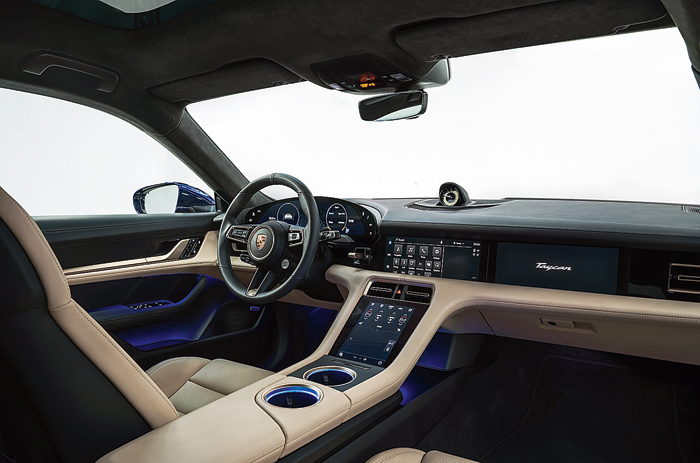The Porsche Taycan has been one of the electric vehicles that has managed to evoke a great deal of interest. If the Teslas showed the world that electric cars need not be dumpy little glorified golf carts with bubble tops and quirky looks, the Taycan has taken that story that much further.
Endowed with looks that are unmistakably Porsche, the Taycan was shown in two variants — the Turbo and the Turbo S. The nomenclature is probably a throwback to the company’s cars running on hydrocarbon fuel, but this is a fully-electric machine.
About the two models, the company says: “They are at the cutting edge of Porsche e-performance, and are among the most powerful production models that the sports car manufacturer currently has in its product range. A less powerful version of these all-wheel drive vehicles will follow later this year, and the Taycan Cross Turismo will introduce a new body style at the end of next year. By 2022, Porsche will have invested more than six billion euros in electromobility.”
The Taycan is the first production vehicle with a system voltage of 800 volts instead of the usual 400 volts for electric cars. This is a particular advantage for Taycan drivers on the road. In just over five minutes, the battery can be recharged using direct current (DC) from the high-power charging network for a range of up to about 100km, measured according to global testing standards.
The charging time for five per cent to 80 per cent SoC (state of charge) is 22.5 minutes under ideal conditions, and the maximum charging power (peak) is 270 kW. Taycan drivers can comfortably charge their cars with up to 11kW of alternating current (AC) at home or at charging stations.
The Taycan have two efficient E-machines on the front and rear axles, so they have four-wheel drive. These benefit both the range and the continuous performance of the drive. E-machine, gearbox and pulse inverter are each combined to form a compact drive module. The modules have the highest power density (kW/litre) of all electric cars available today.
In the Taycan, the number of switches or buttons has been pared down and moved to either the touchscreens or voice control, like a lot of other electric vehicles in the market currently.
The Taycan surely has the makings of a pathbreaker and is a fitting addition to the Porsche lineup.

The free-standing and curved instrument cluster forms the highest point on the instrument panel. This clearly emphasises the driver’s axis. A central, 10.9-inch infotainment display and another, optional display for the passenger are positively combined to form a black-panel optic. Porsche
The Telegraph spoke with Porsche India director Pavan Shetty about the Taycan and hybrids...
On the Taycan
We are preparing for the arrival of our first fully-electric sportscar (globally), the Taycan. The first electric car (from Porsche India) will also be the Taycan, which will come in the first six months of next year (2020). Electric cars have generated a lot of interest. And the ‘electric’ part of it makes it even more exciting. Porsche’s electric car is going to be more exciting than anything else as it would still focus on the performance.
The Taycan is a very technologically advanced car. It will have a range of close to 500km. It has 800-volt architecture, which means you can charge it enough to go 100km in just about five minutes. And it will drive like a Porsche.
Today, when you have a 911 or a Cayenne, the consumption pattern on a racetrack is very different from what it’s on the road. The power consumption on the road is much less. An electric car is not going to be any different. So when you say it will go 500km, it is also subject to speed conditions and driving style and so on. But, still, the Taycan will be a very efficient car.
On hybrids
Even today we have a Panamera Hybrid, we have a Cayenne Hybrid in a plug-in form. Which means it can go 44-45km on a charge. Just to give an example, I use the Cayenne Hybrid and my house is, say, 20km from office. I charge it once and I am able to travel most of my distance on one charge with a small usage of the petrol engine. And I am finding it very practical, usable, economical and enjoyable to do that. You can even do speeds of 120-130kmph even in pure electric mode. The car also manages its engine very smartly.











